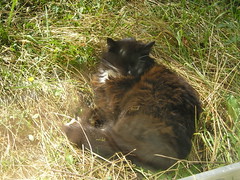 Roots the centre
Roots the centre
Originally uploaded by the view from in here.Back from more Open Space. This time as part of a team of five Gulf Island OSers lead by
Chris Corrigan and including Val Embree, Beverly Neff, and Nancy McPhee. Much appreciation, love and gratitude to all of them for an amazing weekend of co-learning, conversation, and fun.
The Open Space brought together citizen representatives from all of the Island's in the Islands Trust. They spent two days in dialogue about the future of the Islands Trust and ways they could support its preserve and protect mandate.
There were many learning conversations that took place across the weekend, and one that is still unfolding and capturing my attention is about questions. As always, when the initial learning is significant, i tend to keep pushing at the edges to uncover more mysteries beneath...having had a taste of the juiciness of the topic. I have started to pay attention to how i respond when asked a question, to what i am about when i ask a question, and to what others seem to be about when they ask questions.
There's way too much here to post all at once, so i am going to focus on one bit. I would like you to ask yourself, "How often do i actually ask the question i mean to ask?" I am guessing that you are like me in this and that often, probably more often than either of us realize, the real question and the true need that underlay it, gets sensored-out, watered-down--basically left on the cutting room floor. And what comes out is something only distantly related to what we really desire or need to know. Why? Well, i've done a bit of feeling around and i have come up with several possibilities--the main one being fear, probably fear of rejection/exile. That's always the big one. And i also come up against a politeness thing--but i think that is probably just the same fear in different clothes.
And i wonder how often questions cover our inability or unwillingness to trust each other with the contents of our hearts. How often do we ask a polite and innocuous question, because we need to engage or because engagement is expected, when there is something else, wild and inappropriate inside. What does that mean? And what would it be like if we could unlock the fearlessness to say what is true for us in this moment right now--always? And what would it mean to hold space for that--as the receiver of such communication?
I was googling around and at
Space to Think, came across a link to
Trevor's Blog with this quote: “Anything that’s human is mentionable, and anything that is mentionable can be more manageable. When we can talk about our feelings, they become less overwhelming, less upsetting, and less scary. The people we trust with that important talk can help us know that we are not alone.” Mister (Fred) Rogers
The key here, for me, is "the people we trust with that important talk". What a gift and a blessing it is to be trusted so. And what a responsibility.
This happens in facilitating. People trust you to hold the space strongly enough for them to do and say what they need to do and say. I think this is where the practice of the still centre meets the practice of holding. In order to be not only worthy of that trust, but also capable of fulfilling it, i must do my own work to grow an authentic sense of self (a healthy ego, if you will) that can remain centred and still under the pressures of witnessing other's truth. The centre is involved further here, as the process of holding and opening more space when the group hits rough waters is also one of faith. We must be able to maintain faith in ourselves and most importantly, we must maintain an unshakeable faith in the capacity of those who are with us to find their own way forward.



